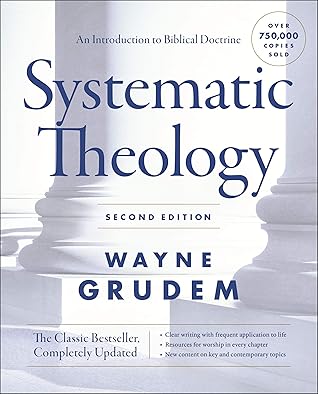More on this book
Community
Kindle Notes & Highlights
The value of these proofs, then, lies chiefly in overcoming some of the intellectual objections of unbelievers. They cannot bring unbelievers to saving faith, for that comes about through belief in the testimony of Scripture when the Holy Spirit awakens in a person the ability to believe God’s words. But such proofs can help overcome objections from unbelievers, and for believers they can provide further intellectual evidence for something they have already been persuaded of from their own inner sense of God and from the testimony of Scripture.
EXPLANATION AND SCRIPTURAL BASIS
We may define the power of the church as follows: the power of the church is its God-given authority to carry on spiritual warfare, proclaim the gospel, and exercise church discipline.
A. SPIRITUAL WARFARE
Yet Paul realizes that he can use this spiritual power not only against those outside the church who oppose the gospel but also against those within the church who are active opponents of his apostolic ministry.
Moreover, Paul did not instruct any leaders of the church at Corinth, or even Timothy or Titus, to exercise that spiritual power at Corinth against his opponents. He spoke about the power which the Lord “has given me” (2 Cor. 13:10), not about the power which the Lord had given to the church or to Christians generally.
B. THE KEYS OF THE KINGDOM
And all believers have this key in a secondary sense, for they can all share the gospel with others and thereby open the kingdom of heaven to those who will enter it.
There are two factors suggesting that the authority of the keys here also includes the authority to exercise discipline within the church:
(1) The plural keys suggests authority over more than one door. Thus, more than simply entrance into the kingdom is implied; some authority within the kingdom is also suggested.
(2) Jesus completes the promise about the keys with a statement about binding and loosing, which closely parallels another saying of his in Matthew 18, in which binding and loosing mean placing under church discipline and releasing from church discipline: “If he refuses to listen even to the church, let him be to you as a Gentile and a tax collector. Truly, I say to you, whatever you bind on earth shall be bound in heaven, and whatever you loose on earth shall be loosed in heaven” (Matt. 18:17–18). But if binding and loosing clearly refer to church dis...
This highlight has been truncated due to consecutive passage length restrictions.
Therefore, it seems that “the keys of the kingdom of heaven” that Jesus promised to Peter in Matthew 16:19 included both
(1) ability to admit people to the kingdom through preaching the gospel and (2) authority to exercise church discipline for those who do enter.
In preaching the gospel and in exercising discipline the church now exercises the authority of the keys of the kingdom.
Nor can the authority of the keys involve authority to forgive sins in any absolute sense, because in Scripture it is clear that that can only be done by God himself (Isa. 43:25; 55:7; Mark 2:7, 10; Ps. 103:3; 1 John 1:9).
Thus Jesus is teaching that church discipline will have heavenly sanction. But it is not as if the church must wait for God to endorse its actions after the actions have occurred. Whenever the church enacts discipline, it can be confident that God has already begun the process spiritually. Whenever it releases from discipline, forgives the sinner, and restores personal relationships, the church can be confident that God has already begun the restoration spiritually (cf. John 20:23). In this way Jesus promises that the spiritual relationship between God and the person subject to discipline will
...more


